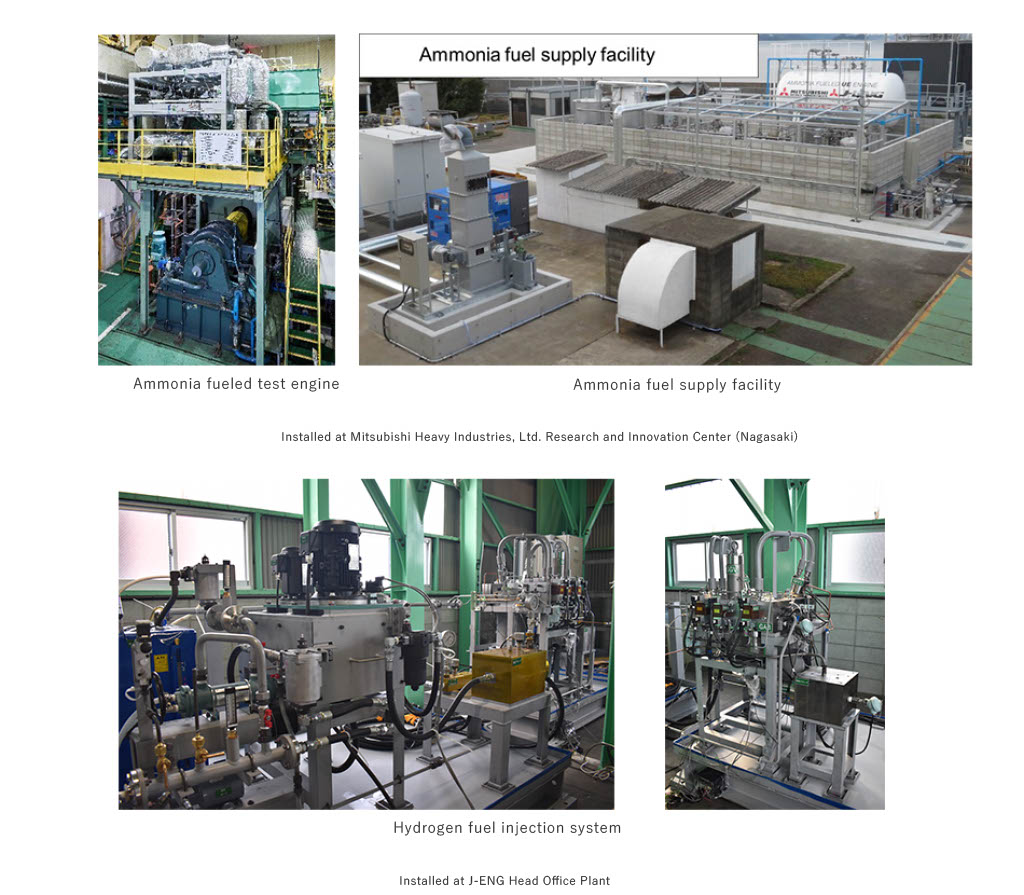The world's first “zero-emission fuel” ammonia co-firing operation of a large low-speed 2 stroke engine for the next-generation ships and testing of hydrogen fuel injection device for a large low-speed two-stroke engine has begun.
Japan Engine Corporation (hereafter J-ENG) is progressing Green Innovation Fund /Next-generation ship development project of NEDO [*] on schedule for a large low-speed two-stroke engine, and has now started “zero-emission fuel” ammonia co-firing operation for the first time in the world.
At the same time, J-ENG began testing the hydrogen injection device for a hydrogen fueled engine.
[*] NEDO: New Energy and Industrial Technology Development Organization
The ammonia fueled test engine is installed at Mitsubishi Heavy Industries, Ltd. Research and Innovation Center (Nagasaki). This time the test engine is newly equipped with the “Stratified injection system” of J-ENG’s unique technology.
J-ENG will operate the test engine with ammonia fuel under various conditions over the next year.
A new facility to supply ammonia fuel to the test engine has also been installed adjacent to the building where the test engine sitting, and the knowledge and the experience gained from the operation of this facility will be fed back to the development of ammonia fuel supply facilities on board for ships.
In parallel, J-ENG will develop, design, and manufacture a full-scaled ammonia fueled engine for demonstration, which is scheduled to be completed in September 2025 after about six months of actual shop operation for verification.
As for the hydrogen fueled engine, the hydrogen fuel injection device, one of its key technologies, has been installed at J-ENG's head office plant in Akashi city and its operation tests have begun. J-ENG will use this equipment for more than one year to verify the design details of the injection system for hydrogen and accumulate basic data.
After the above process, J-ENG will proceed with the development, design and manufacturing of a full-scaled hydrogen fueled engine for demonstration, which is scheduled to be completed in March 2027 after about one year of actual shop operation for verification in 2026.
J-ENG will thoroughly verify the performance, quality and safety through the use of the ammonia fueled test engine and the hydrogen fuel injection device, and will strive to develop next-generation engines which meet the needs of a good balance between economic and environmental performance.
By bringing these next-generation engines to market at an early stage and promoting their widespread use, we will contribute to the development of the Japanese shipping and shipbuilding industries. And at the same time, J-ENG will contribute to the reduction of greenhouse gases (GHG) in the shipping industry and the achievement of carbon neutrality by 2050.

<Note>
Ammonia fuel is a flame-retardant fuel, and the technical challenge is to burn the fuel efficiently and minimize the generation of nitrous oxide (N₂O), which has a high global warming potential. J-ENG’s ammonia fueled engine solves these issues by utilizing our proprietary "stratified injection technology" for optimal combustion control.
The ammonia co-firing ratio can be set in accordance with various ship’s operations which depend on future progress in the development of ammonia fuel infrastructure, ammonia fuel price and trends in environmental regulations.
Hydrogen fuel is easy to ignite and burns very fast. Therefore, making stable control of its combustion will be our challenge. We are currently developing a hydrogen fueled engine using a high-pressure injection method, in which hydrogen is injected directly when the combustion chamber reaches high temperature and pressure.
We are also aiming to commercialize a hydrogen fueled engine with even higher environmental performance by using such as an electric ignition system.
Business contact
Japan Engine Corporation
General Affairs & Public Relations
